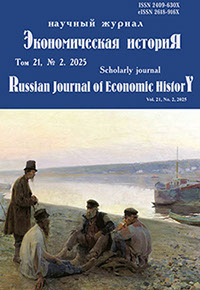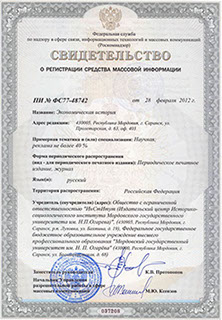Экономическая историЯ
Russian Journal of Economic History
ISSN 2409-630X (Print)
ISSN 2618-916X (Online)
Expert board:
- Scientific Council of RAS on economic history;
- Research and Educational Center «The economic history of Central Russia and the Middle Volga region» of Ogarev Mordovia State University;
- Center of Economic History of Lomonosov Moscow State University
Navigation
Tatyana A. Chaltseva
Kursk State Medical University (Kursk, Russia),
e-mail: T.A.C.2002@yandex.ru
The Role of Excise Officials in the Formation of the Provincial Excise Management System in Russia in the Second Half of the 19th Century (using the example of Kursk province)
Abstract
Introduction. The subject of the study is the excise tax system in Russia in the second half of the 19th century and the formation of local excise authorities through an analysis of the activities of excise officials who replaced tax collectors and allowed them to approve not only new taxation procedures, but also the attitude of local governments and producers towards them.
Materials and Methods. The research is based on unpublished documents opened in the funds of the Russian State Historical Archive (RGIA) and the State Archive of the Kursk Region (GAKO), some of which are being put into circulation for the first time, monographs and memoirs. The work uses a combination of structural-functional and formal-logical methods of analysis, synthesis and generalization in historical cognition.
Results. During the implementation of public administration reforms in the middle of the
19th century, global socio-economic transformations took place in Russia. Thus, the effectiveness of tax policy was achieved by consistently matching the interests of the state and taxpayers in conditions of protectionism, as well as by creating an excise tax system based on priority indirect taxation. The organization of excise supervision in a well-structured vertical centralized financial system was based on the full responsibility of the managers of Provincial Excise administrations, protecting the public interest in the context of constant modernization and playing a huge role in the administration of excise duties, which became the main source of state revenue. That is why it is important to show the role of the personal potential of excise officials who had a strong desire to serve for the benefit of the renewal of the Fatherlands, a prominent representative of which is the manager of the Excise Department of Kursk province, B. K. Kukel.
Discussion and Conclusion. The problems of further development of the Russian economy, requiring improvement of the tax system as an economic regulator, should be solved taking into account the reasonable profitability of tax relations based on domestic and foreign tax management experience. The fiscal importance of excise taxes is recognized by leading economists as the best in terms of simplicity and rationality, but it requires constant analysis of the variability of the priority functions of excise taxes and the formation of human capital in conditions of effective administration by the tax system.
Keywords: finance, taxes, indirect taxes, officials, excise duty, excise management, manager of excise management, Non-tax Collection Department.
For citation: Chaltseva T. A. The Role of Excise Officials in the Formation of the Provincial Excise Management System in Russia in the Second half of the 19th Century (Using the Example of Kursk province). Ekonomicheskaya istoriya = Russian Journal of Economic History. 2025; 21(2): 156–164. (In Russ.).
DOI: 10.24412/2409-630X.069.021.202502.156-164.
© Ogarev Mordovia State University. History and Sociology Institute, 2017
68, Of. 411, Bolshevistskaya St., 430005, The editorial office of the scholarly journal «Russian Journal of Economic History»
Tel.: (8342) 24-25-90; 27-07-11, Fax: (8342) 24-25-90, E-mail: jurnal-econom-hist@isi.mrsu.ru
Designed by A. Napalkov, Email: napalkov@isi.mrsu.ru


